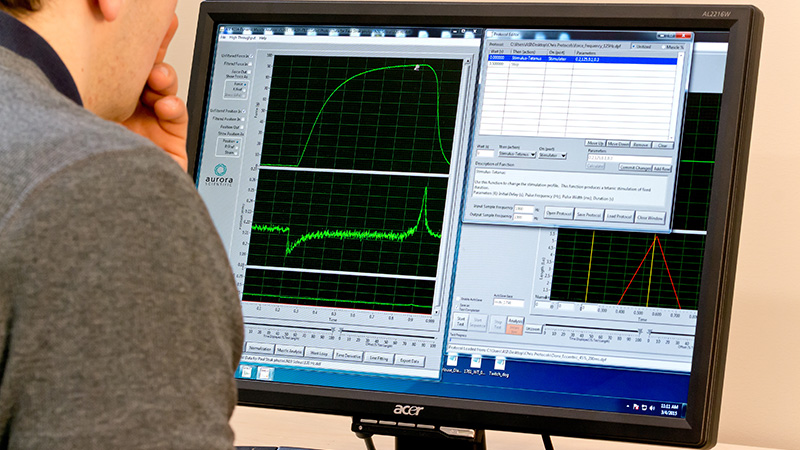Muscle Data Acquisition Hardware & Software
Complete Systems

600A: Real-Time Muscle Data Acquisition and Analysis System
A precision, real-time controller and data acquisition system for Aurora Scientific apparatus and measurement devices

605A: Dynamic Muscle Data Acquisition and Analysis System
Integrated, Windows based, powerful and complete data acquisition and analysis system handling the entire data collection, control and analysis of muscle contractile experiments
Hardware
The 604A Analog-to-Digital Interface was designed to enable physiology researchers to easily interface a Dual-Mode muscle lever, force transducer, high-speed length controller and stimulator to a National Instruments PC-based A/D card. The 604A Interface consists of a 1U (1.75”) high, 19” wide, rack-mount case with BNC connectors on the front and a ribbon cable connector on the back. 604B and 604D models accommodate four or two setups (respectively), while the 604B also provides integrated stimulator control.
Software

615A: Dynamic Muscle Control and Analysis Software
Dynamic Muscle Control and Analysis Software Suite handles experimental control, data collection and data analysis for muscle contractile experiments
Content for the Muscle Physiologist
Women’s Health Month: Strides in Muscle Physiology
In honour of Women's Health Month, May’s publication review covers recent advances in female-focused muscle physiology research. These investigations into gradual ovarian failure, the impact of non-sugar sweeteners during the reproductive stage, and the effects of partial glycogen synthase kinase 3 knockdown, collectively advance our understanding of how sex differences can impact muscle physiology.
Out of This World Research at Brock University: Post Mission Insights into Alterations of Soleus Muscle Function in Space-Flown Mice
Hear Dr. Val Fajardo, Jessica Braun, and Briana Hockey on their experience working on NASA's Rodent Research-20 (RR-20) mission at the Roskamp Institute, the data collected utilizing Aurora Scientific equipment, and future directions of the lab.
Spring into Action: Proteins of the Myofilament
In anticipation of the upcoming Myofilament Meeting, April’s publication review covers recent advances in the myofilament field. From the effects of inotropic agents on cardiac myofilament Ca2+ sensitivity, protein kinase D’s role in cardiac homeostasis, and the contribution of specific myosin-binding protein C domains in muscle contraction, the following studies usher in a promising trend of exciting breakthroughs.






